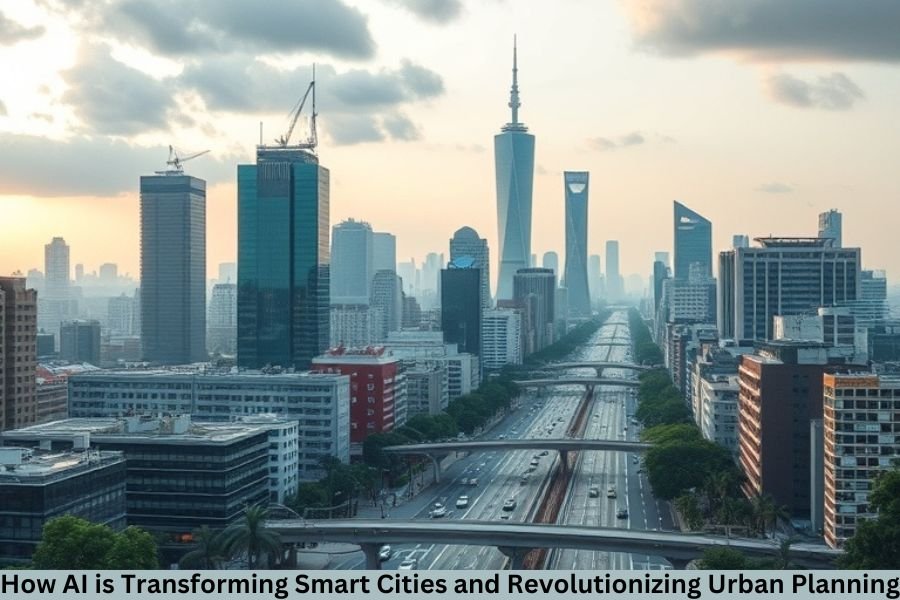Imagine a world wherein towns are seamlessly interconnected, in which every road light, site visitors signal, and public carrier works in harmony to create a better living revel in for residents. This is the imaginative and prescient of clever cities, where artificial intelligence (AI) performs a vital role in urban planning.
As urban regions continue to grow rapidly, traditional strategies of town planning are proving insufficient to handle the complexities of current cities. AI, with its capability to analyze huge datasets and expect results, is revolutionizing how we layout, control, and maintain our city environments.
What is the Role of AI While Planning for a Smart City?
AI is on the heart of clever city development, enabling city planners to make knowledgeable selections by using leveraging records analytics.
Enhancing Data-Driven Decision-Making
AI strategies massive amounts of records from numerous assets, including sensors, social media, and satellite imagery, to offer actionable insights for city planners.
Predictive Analytics in Urban Development
AI can predict destiny trends, along with population boom and site visitors styles, assisting planners put together for demanding situations earlier than they stand up.
Streamlining Resources and Energy Efficiency
Smart systems powered by way of AI ensure most beneficial useful resource allocation, lowering waste and improving energy performance throughout the city.
How is AI Used in Urban Planning?
AI applications in city planning are various, ranging from traffic control to infrastructure preservation.
Traffic Management and Optimization
Real-time site visitors monitoring thru AI-powered cameras and sensors allows reduce congestion, saving time and reducing emissions. Algorithms examine traffic styles and suggest change routes or regulate sign timings dynamically.
Zoning and Land-Use Planning
AI assists in balancing the allocation of land for residential, commercial, and green spaces with the aid of reading demographic statistics and urban boom trends.
Infrastructure Design and Maintenance
AI predicts whilst infrastructure like roads and bridges will want upkeep, stopping highly-priced maintenance and making sure public safety.
What is the Smart City Concept in Urban Planning?
Smart towns use a aggregate of IoT and AI technologies to create a continuing, interconnected urban atmosphere.
Smart Grids and Energy Management
AI optimizes energy distribution, ensuring minimum electricity loss and integrating renewable energy assets effectively.
Citizen-Centric Services
Smart city structures powered by means of AI provide actual-time updates on public transportation, emergency services, or even waste collection schedules.
What is the Role of Technology in a Smart City?
Interconnection Through IoT
IoT devices collect real-time data, permitting AI to investigate and offer actionable insights.
Big Data and Decision-Making
AI uses massive records to pick out patterns and developments that tell better urban making plans techniques.
Cloud Computing in City Management
Cloud-based systems make sure seamless access to metropolis control equipment and services, enhancing efficiency and scalability.
What is the Role of Smart Technology?
Improving Quality of Life
Smart technology decorate residing standards through making cities safer, purifier, and extra green.
Enhancing Public Safety
AI-powered surveillance systems detect and prevent crimes, ensuring a secure environment for residents.
Environmental Monitoring
AI enables song air first-class, water ranges, and weather changes, enabling proactive measures to fight environmental problems.
Case Studies of AI in Smart Cities
Singapore
Singapore’s AI-pushed traffic systems have notably decreased congestion and travel instances.
Barcelona
Barcelona’s clever waste control structures and strength-green street lighting exemplify the ability of AI in city making plans.
Copenhagen
Known for its consciousness on sustainability, Copenhagen uses AI to optimize energy use and improve air satisfactory.
Challenges in Implementing AI in Smart Cities
While AI offers enormous capability, there are hurdles to its implementation.
Data Privacy and Security Issues
Ensuring that citizen facts is included is a vital assignment in AI-powered systems.
High Implementation Costs
Deploying AI systems requires tremendous funding, which won’t be possible for all cities.
Integration with Existing Systems
Adapting legacy infrastructure to modern AI systems may be complicated and time-consuming.
Conclusion
AI is redefining urban making plans and clever towns, making them greater green, sustainable, and citizen-pleasant. As we hold to innovate, the integration of AI will form the future of urban dwelling, making sure towns continue to be colourful and livable for generations to come back.
FAQs
What is the role of AI while making plans for a smart town?
AI allows urban planners examine facts, predict developments, and optimize sources for better town control.
How is AI utilized in city making plans?
AI is used for traffic optimization, infrastructure upkeep, and zoning, among different packages.
What is the smart town idea in urban making plans?
It entails integrating AI and IoT technologies to create interconnected and green urban ecosystems.
What is the position of generation in a smart city?
Technology enables seamless facts series, evaluation, and implementation of metropolis management strategies.
What is the function of smart generation?
Smart technology improves exceptional of lifestyles, complements protection, and monitors environmental changes in cities.
